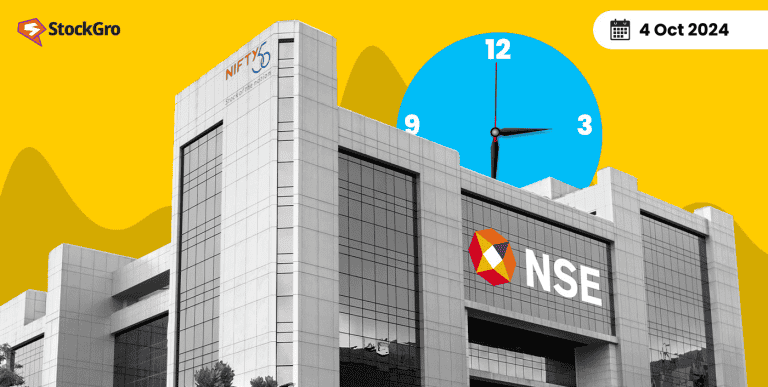
Markets are a product of several factors in action. These can be the number of investors, instruments in the market, market regions, demand-supply, investment psyche, etc. They have positive and negative effects that drive the market prices. Understanding these factors can potentially help investors crack how the market operates.
However, one of the crucial factors of market operations is its efficiency. It is quite a less-known concept for small or new investors but has a significant impact on investors’ behaviour. Let’s understand this concept of market efficiency, decode its level/types, and test methods to understand the overall investment strategy.
What is market efficiency?
Markets are home to various types of investors. Some perceive it to be complex while some crack it frequently. One of the key drivers of an investor’s psychology is the efficiency of the market. This efficiency of the market is the capability of the market to accommodate information to facilitate investment strategies.
facilitate the investment strategies of investors.
Market efficiency also indicates its bias towards the fair value of an investment. An unbiased market is considered to be efficient. Investors seek information on the market prices to ascertain the fair value of an asset. When there is no information, and one cannot preempt the market movement, it usually considers the market to be inefficient.
Market efficiency is highly connected to an investor’s point of view and abilities. However, a market will be at a different efficiency level during varying times. Understanding market efficiency can help investors decide their investment strategy in a particular market.
Market Efficiency doesn’t imply this:
Understanding what is not implied by market efficiency is crucial to preempting the market movements and deciding the suitable investment strategy.
- Market efficiency does not imply that the current value cannot ever deviate from the fair value of an investment.
- The lack of market information does not indicate that the market cannot be ever beaten. Applying potential analysis and skills may help investors find the gap in pricing.
Significance of market efficiency
Market efficiency is a significant indicator of a well-functioning market. Therefore, when investors understand the market efficiency, they can benefit from the information available. Moreover, this information can help investors crack potential opportunities.
Markets are a zero-sum game. When an investor perceives that the market is inefficient and doesn’t hold any information regarding true value, there would be other investors with a point of view that markets are efficient. Profit generation from the asset market is based on tapping such appropriate opportunities.
Levels of market efficiency
The market is affected by several factors. Therefore, the levels or type of market efficiency are decided by the extent to which information is available in the market price.
- Weak
In this type of market, the investors perceive that the market is inefficient and the market only has information regarding past price movements. When this information is available, the technical analysis of past prices and volumes may not be useful for an investor. New information would be required to beat the market.
For example, an investor seeking past price and volume patterns from the technical chart may be unable to predict future moves due to multiple resistance or support levels.
- Semi-strong
This stage provides investors with the support of more factors affecting the market. Here, the public information of news, financial regulations, public reports, etc., are publicly available for assessment and can help reach some valuation levels for that instrument. Analysing only the company’s financials may not help investors at this stage, and would require a comprehensive analysis of the available public details.
For example, a company announces quarterly results where its earnings have increased. However, an investor willing to beat the market may require more information, which will help outperform the regular gain.
- Strong
It is the situation when there is ample availability of information in the market, and all the investors can easily take benefit of the same. In such a case, the price gap can be filled quickly due to ample availability and markets will be moving collectively. Due to this widespread availability, investors may not find any undervaluation in the market.
For example, when a company’s management is revamped, and is positively growing in all terms, investors may not be able to find space for undervaluation or overvaluation.
Check this out: Behavioural finance: Understanding the psychology behind investment decisions.
Tools to test market efficiency
Market efficiency, explained by some of these quantitative and qualitative tools can help shape an investor’s strategy for that period.
- Index comparison
Stock market indices are one of the finest tools for performance comparison. An investor can compare a stock’s performance with its market benchmark, such as a crucial market index, in a similar timeframe. However, it will not include the risk factor of that particular instrument.
- Sharpe ratio
It accounts for the risk factors and divides the excess return of an instrument with the volatility of that excess return. Ascertaining the standard deviation for the volatility can help investors understand how risk is adjusted, and its gap will indicate the efficiency of the market in determining undervaluation or overvaluation. Sharpe ratio between 1 and 2 is considered acceptable.
- Information ratio
It will evaluate the active investment strategy of the portfolio with a market benchmark to decide the efficiency of the market. It divides the excess returns of a portfolio by risk relative to the benchmark. Between 0.4-0.7, the ratio is considered potential. More the ratio, the better the return generating ability.
- Event Study
It is one of the most effective qualitative ways to determine market efficiency. It considers an event and the market’s reaction to that event. The event can be the availability of specific news or information, a domino effect of a far-sighted event or anything else.
The concept of market efficiency is more famous due to its efficient market hypothesis, which accounts for a market to be in its strong stage.
Efficient market hypothesis theory
It is one of the most famous theories employed by many market scholars at differing levels. The hypothesis deals with the ability of the market to accommodate every related information in the current share price. Moreover, it indicates that due to this facility, shares are trading at their fair value.
Usually, investors with strong faith in the efficient market hypothesis make passive investments as they believe that one cannot find any undervalued instrument in the market. Moreover, according to them, markets are optimally efficient. Some fund managers also base this theory on investing in passive funds.
Also, read: What is the efficient market hypothesis?
Bottomline
Market efficiency is a key phenomenon of financial economics, and investors can potentially use it to strategies ways to outperform the market. The three levels of market efficiency based on information gap indicates the under or over valuation. It is quite significant to understand the market efficiency to gauge the market performance.
An interesting read: How to understand stock market trends
FAQs
- What are the three levels of market efficiency?
As per market efficiency, there are three levels or types of market. The lowest level is a weak form, which indicates that past prices have information for current price action. The semi-strong level suggests that the market has public information and prices about current prices. The strong market efficiency indicates that the market has all the information about historical prices and public and private information.
- What is an efficient market hypothesis?
The efficient market hypothesis states that a stock price reflects all the information in the market. It is accompanied by the belief that the stock market cannot be beaten and one cannot find undervalued opportunities in the market. Moreover, investors believe this makes passive investments. However, this belief is not completely true, and actual results may differ from this notion.
- What does market efficiency mean?
The ability of a market to include the information is referred to as its efficiency. Market efficiency is a key component of investment behaviour,\ and can have a significant effect when evaluated collectively. It is highly dependent on an investor’s point of view, and no one notion can be true or false.
- What leads to market efficiency?
Several indicators can be part of an investor’s analysis while determining market efficiency. Therefore, factors such as the depth of the market, market participants, coverage of an analyst, and information availability can potentially lead to market efficiency.

